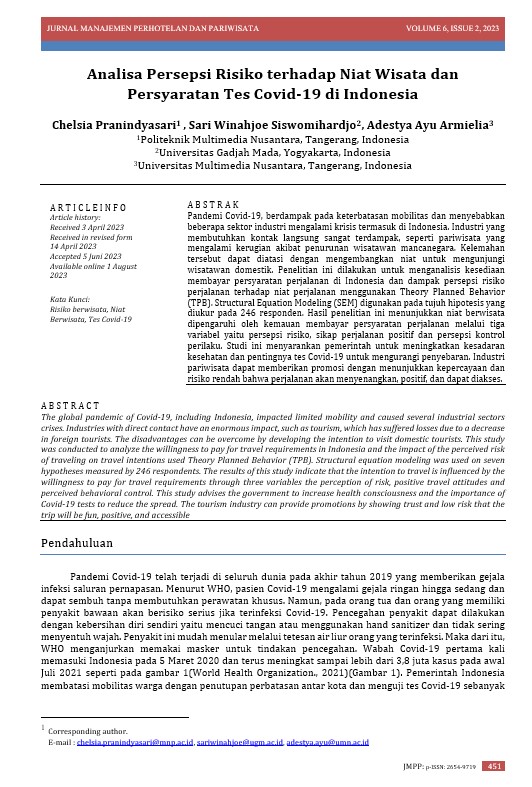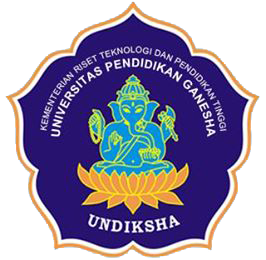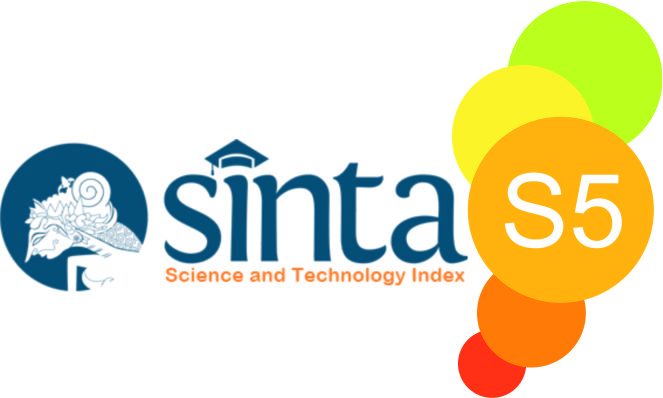Analisa Persepsi Risiko terhadap Niat Wisata dan Persyaratan Tes Covid-19 di Indonesia
DOI:
https://doi.org/10.23887/jmpp.v6i2.60244Keywords:
Risiko berwisata, Niat Berwisata, Tes Covid-19Abstract
The global pandemic of Covid-19, including Indonesia, impacted limited mobility and caused several industrial sectors crises. Industries with direct contact have an enormous impact, such as tourism, which has suffered losses due to a decrease in foreign tourists. The disadvantages can be overcome by developing the intention to visit domestic tourists. This study was conducted to analyze the willingness to pay for travel requirements in Indonesia and the impact of the perceived risk of traveling on travel intentions used Theory Planned Behavior (TPB). Structural equation modeling was used on seven hypotheses measured by 246 respondents. The results of this study indicate that the intention to travel is influenced by the willingness to pay for travel requirements through three variables the perception of risk, positive travel attitudes and perceived behavioral control. This study advises the government to increase health consciousness and the importance of Covid-19 tests to reduce the spread. The tourism industry can provide promotions by showing trust and low risk that the trip will be fun, positive, and accessible
References
Ajzen, I. (1991). The theory of planned behavior. Organizational Behavior and Human Decision Processes, 50(2), 179–211. https://doi.org/10.1016/0749-5978(91)90020-T
Ajzen, I., & Fishbein, M. (1980). Understanding attitudes and predicting social behavior. Prentice-Hall, Englewood Cliffs, N.J.
Bruwer, J., & Cohen, J. (2019). Restaurants and wine by-the-glass consumption: Motivational process model of risk perception, involvement and information-related behaviour. International Journal of Hospitality Management, 77, 270–280. https://doi.org/10.1016/j.ijhm.2018.07.006
Cooper, D. R., & Schindler, P. S. (2014). Business Research Methods 12 e. . New York: McGraw-Hill.
Hofstede. (2021). Hofstede Indonesia Culture. Hofstede Insights. https://www.hofstede-insights.com/country-comparison/china,indonesia,japan,south-korea/
Hsu, C. H. C., & Huang, S. (Sam). (2012). An extension of the theory of planned behavior model for tourists. Journal of Hospitality & Tourism Research, 36(3), 390–417. https://doi.org/10.1177/1096348010390817
Hu, H., Zhang, J., Chu, G., Yang, J., & Yu, P. (2018). Factors influencing tourists’ litter management behavior in mountainous tourism areas in China. Waste Management, 79, 273–286. https://doi.org/10.1016/j.wasman.2018.07.047
Hu, H., Zhang, J., Wang, C., Yu, P., & Chu, G. (2019). What influences tourists’ intention to participate in the Zero Litter Initiative in mountainous tourism areas: A case study of Huangshan National Park, China. Science of The Total Environment, 657, 1127–1137. https://doi.org/10.1016/j.scitotenv.2018.12.114
Hultman, M., Kazeminia, A., & Ghasemi, V. (2015). Intention to visit and willingness to pay premium for ecotourism: The impact of attitude, materialism, and motivation. Journal of Business Research, 68(9), 1854–1861. https://doi.org/10.1016/j.jbusres.2015.01.013
Hutchins, R. K., & Greenhalgh, L. A. (1995). Organic confusion: sustaining competitive advantage. Nutrition & Food Science, 95(6), 11–14. https://doi.org/10.1108/00346659510103584
Janssen, M., & Hamm, U. (2012). Product labelling in the market for organic food: Consumer preferences and willingness-to-pay for different organic certification logos. Food Quality and Preference, 25(1), 9–22. https://doi.org/10.1016/j.foodqual.2011.12.004
Jayanti, R. K., & Burns, A. C. (1998). The antecedents of preventive health care behavior: An empirical study. Journal of the Academy of Marketing Science, 26(1), 6–15. https://doi.org/10.1177/0092070398261002
KPCPEN. (2020, November 4). Memahami Perilaku dan Informasi Tepat untuk Mencegah Penularan COVID-19: Covid19 go id. https://covid19.go.id/p/berita/memahami-perilaku-dan-informasi-tepat-untuk-mencegah-penularan-covid-19
Lam, T., & Hsu, C. H. C. (2006). Predicting behavioral intention of choosing a travel destination. Tourism Management, 27(4), 589–599. https://doi.org/10.1016/j.tourman.2005.02.003
Lath, V., Lee, T., Tan, K. T., & Wibowo, P. (2020, September 8). With effort, Indonesia can emerge from the COVID-19 crisis stronger. McKinsey Company. https://www.mckinsey.com/featured-insights/asia-pacific/with-effort-indonesia-can-emerge-from-the-covid-19-crisis-stronger
Lee, C.-K., Song, H.-J., Bendle, L. J., Kim, M.-J., & Han, H. (2012). The impact of non-pharmaceutical interventions for 2009 H1N1 influenza on travel intentions: A model of goal-directed behavior. Tourism Management, 33(1), 89–99. https://doi.org/10.1016/j.tourman.2011.02.006
Lobb, A. E., Mazzocchi, M., & Traill, W. B. (2007). Modelling risk perception and trust in food safety information within the theory of planned behaviour. Food Quality and Preference, 18(2), 384–395. https://doi.org/10.1016/j.foodqual.2006.04.004
Mai, R., & Hoffmann, S. (2012). Taste lovers versus nutrition fact seekers: How health consciousness and self-efficacy determine the way consumers choose food products. Journal of Consumer Behaviour, 11(4), 316–328. https://doi.org/10.1002/cb.1390
Malhotra, N. K. (2019). Marketing research: An applied orientation (7th ed.). Pearson/Prentice Hall.
Mothersbaugh, D. L., & Hawkins, D. I. (2016). Consumer Behavior Building Marketing Strategy (13th ed.). McGraw-Hill Education.
Quintal, V. A., Lee, J. A., & Soutar, G. N. (2010). Risk, uncertainty and the theory of planned behavior: A tourism example. Tourism Management, 31(6), 797–805. https://doi.org/10.1016/j.tourman.2009.08.006
Ramdas, M., & Mohamed, B. (2014). Impacts of Tourism on Environmental Attributes, Environmental Literacy and Willingness to Pay: A conceptual and theoretical review. Procedia - Social and Behavioral Sciences, 144, 378–391. https://doi.org/10.1016/j.sbspro.2014.07.307
Sánchez-Cañizares, S. M., Cabeza-Ramírez, L. J., Muñoz-Fernández, G., & Fuentes-García, F. J. (2021). Impact of the perceived risk from Covid-19 on intention to travel. Current Issues in Tourism, 24(7), 970–984. https://doi.org/10.1080/13683500.2020.1829571
Sönmez, S. F., & Graefe, A. R. (1998). Determining future travel behavior from past travel experience and perceptions of risk and safety. Journal of Travel Research, 37(2), 171–177. https://doi.org/10.1177/004728759803700209
Wang, C., Zhang, J., Cao, J., Hu, H., & Yu, P. (2019). The influence of environmental background on tourists’ environmentally responsible behaviour. Journal of Environmental Management, 231, 804–810. https://doi.org/10.1016/j.jenvman.2018.10.089
Wang, C., Zhang, J., Xiao, X., Sun, F., Xiao, M., & Shi, Q. (2020). Examining the dimensions and mechanisms of tourists’ environmental behavior: A theory of planned behavior approach. Journal of Cleaner Production, 273, 123007. https://doi.org/10.1016/j.jclepro.2020.123007
World Bank. (2020). Indonesia economic prospects towards a secure and fast recovery.
World Health Organization. (2021, May 4). WHO coronavirus (covid-19) dashboard. WHO. https://covid19.who.int/










